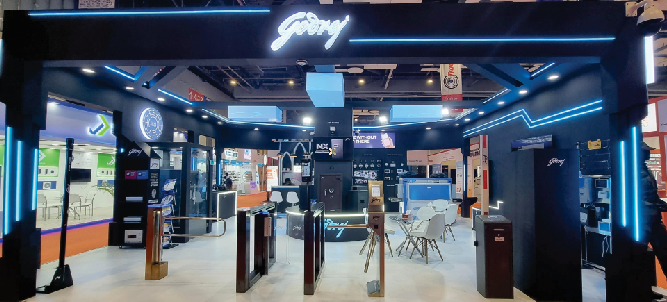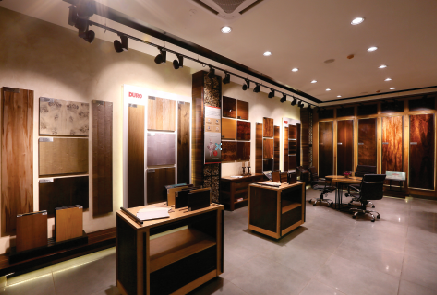
Agriwood status in Haryana & Tamilnadu for Raw Material of WBI
- January 8, 2024
- 0
Suresh Bahety:
- In the last two years, the wood-based industry is facing a tough time, main reason for which is the shortage of wood.
- Among the wood consuming industries, paper industry has become self-reliant and the MDF industry has also come a long way in captive consumption.
- Both these industries are in the organized sector due to high investment. Whereas the plywood industry is scattered in small units. Therefore the plywood industry is not able to unite and take big initiatives.
- Those industries who have already taken initiative in this regard should tell their story to the people, so that everyone else can also get inspired.
Subhash Jolly:
- It is high time that the timber industry should think about how to get sufficient quantity of wood in the future.
- If the government join together on one platform along with industrialists and farmers, this problem can be solved easily.
- This webinar aims to explain the hurdles in promoting Agro forestry by the industrialists. Which can be sorted out by the experts joining it.
- Moreover, Dr. MP Singh will guide on rules and regulation of the Govt.

MP Singh:
- If the prices of wood fall unexpectedly, farmers become dejected and there is disappointment in plantation.
- Fluctuations in prices also happen in foreign countries, for this a reference price is jointly decided (there).
- A suggestion has been given to the Haryana Government to form a Wood Council on similar lines.
- Haryana Plywood manufacturers association is suggested to urge the government to take initiative towards forming a Wood Council.
- Haryana government has also done the census of trees on the basis of which it can be decided how many more plantations or nurseries are required.
- In Tamil Nadu expecting the shortage of wood, the state government has imposed a ban on exporting wood from the state.
- Short rotation timber does not require very long planning.
Devendra Chawla:
- Rs 196 crore of plywood industry is lying with the Haryana government. The Chief Minister has assured that after a proper planning, it will be utilized for the development of agro-forestry in Haryana.
- An advisory committee has been formed, in which I am also included as a member. Under this, a proposal has been made to develop a hi-tech nursery in Yamunanagar.
- If other states also start restricting inter state trade of timber like Tamil Nadu, then Haryana’s industry will be in the biggest problem. Therefore, Haryana will have to promote agro-forestry by adopting every possible means.
- Industrialists of Haryana are affirmative to keep the prices of wood stable.
- Apart from poplar, milia dubia should also be encouraged for face veneers.
- The government will hold a collective discussion with farmers and industrialists, which is likely to happen very soon.
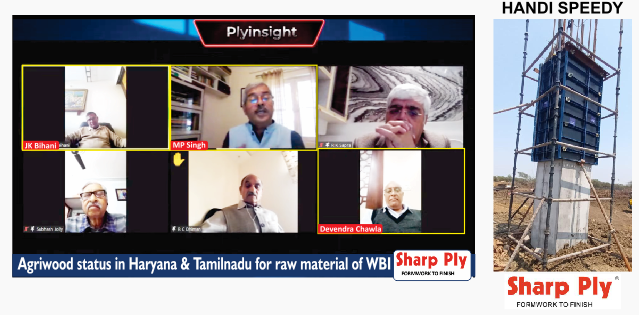
MP Singh:
- Be more focused to form Wood Council as suggested earlier. So that all stakeholders can express their views on a single platform. And the decisions taken can be easily implemented.
- Therefore, instead of making small demands from the government, try to form a Wood Council. CM will also actively participate in it.
JK Bihani:
- The land of Northern Haryana is fertile. Despite so many hurdles, poplar is being cultivated here.
- Compared to Tamil Nadu, Haryana has one-third land area, about 45,000 square kilometers. Moreover 14 districts are under NCR. Due to increased land prices, farmers are less inclined towards the cultivation of popular Safeda. But maximum industries are located here.
- It can be balanced, if incentives can be given to farmers.
- FSC certification of wood can be done, so that the products made from such wood get higher price in export. And farmers should not face any problem in getting higher prices.
- However, currently farmers are paid very good prices for wood. In comparison, imported wood is cheaper.
- It is also a fact that thare are very remote chances that the price of wood will reduce drastically in the future.

MP Singh:
- The proposal for FSC certification is pending with BIS. No suggestions have been received from industries. Industrialists will have to come forward and make efforts for it.
- It is also a fact that FSC was brought in for the timber of the forest. The plywood industry consumes timber from the agro-forestry sector.
JK Bihani:
- The government should assist in getting land abroad on lease for timber plantation.
MP Singh:
- Identification of land and further efforts will have to be initiated privately, as a first step.
- Latin America does not have its own consumption for Teak. But the Teak is being produced only for export. And India is also a significant importer.
JK Biyani:
- Due to globalization and new discoveries in technology, drastic changes are possible in industries.
MP Singh:
- I assume that there may be fragmentation of products in industries and specialization in one type of product.
- A big possibility is that the marketing of products can be managed under a single brand for each cluster of industries.
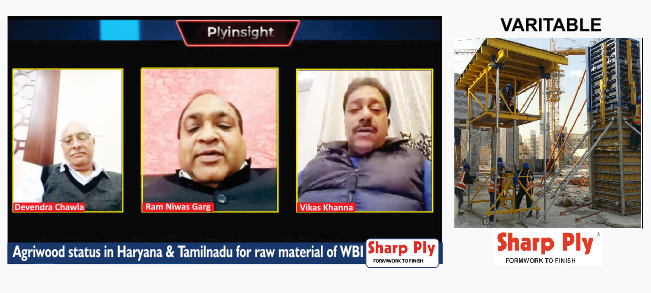
Devendra Chawla:
- In our advisory committee meeting, a request was made to subsidize the industries on the lease amount of the land adapted for plantation.
Ram Niwas Garg:
- Being associated with the government and being the constituency of Forest Minister Kanwar Pal ji, we are trying our best maximum efforts for the development of poplar and Eucalyptus for the industry.
- CM Manohar Lal is working seriously to promote the industry.
- We will try our best for the industry. It is regularly discussed that how timber should be made surplus as raw material for the wood industry.
Vikas Khanna:
- Why there should not be anti-dumping duty should be imposed on poplar and Eucalyptus. The government should take initiative for it.
- The industry can benefit from it. If anti-dumping duty is imposed on poplar and safeda, it will be ensured that farmers get a fair price for the wood.
- This will encourage farmers to put more efforts for tree plantation.
MP Singh:
- There should be more clarity about AD duty. It is not easy to ask for this provision. International organizations are strict on it.
- There is already a shortage of timber. Therefore anti dumping cannot be imposed here.
- Instead, FIPPI has even asked to abolish the import duty.
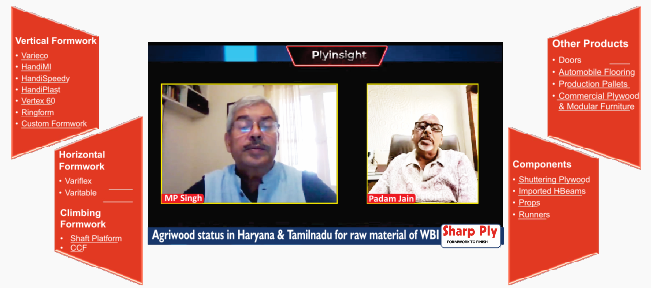
Padam Jain:
- Today, the industries of Yamunanagar are getting 50 to 75 percent more expensive wood compared to the rest of India. The production cost is increasing due to this. It is a big challenge to sustain the industry.
- The frieght from the port to here increases while Importing or exporting.
- There was abundant wood in Yamunanagar, due to which industry flourished here. Now this situation is changing. Financial problems are also occurring due to this.
- Today the demand for FSC certified wood is increasing. We are not able to get this certificate.
- FSC certification is the responsibility of the farmer or the industrialist?
MP Singh:
- We have proposed that it should be certified through BIS. It should be mentioned that wood from agro-forestry and not from the forest has been used in this product. BIS can go internationally to ensure that the certificates issued by them are recognised.
- Almost all the countries of Southeast Asia, which are into agroforestry, are facing this problem.
- Internationally, there are two types of groups, one is the producer, the other is the consumer.
- We are planning to digitalize the plantation. The sooner BIS implements this, the better it will be for the industry and agro-forestry.
RC Dhiman:
- I want to know we ther agro-forestry wood can be taken out of the scope of FSC certificate, but whereas FSC certificate is required in European countries. So will they consider our wood.
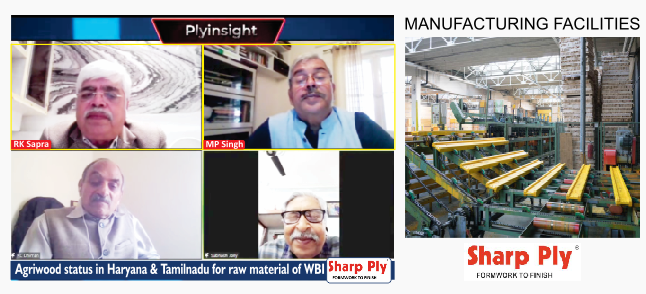
MP Singh:
- Any European country asks for only the legal source of production and producer in the certificate.
- FSC is a private institution; they are putting pressure. They messages to small producers to obtain FSC certificate. Non of the government is encouraging FSC. If there is another certificate in place of FSC, it will be accepted.
RC Dhiman:
- In Haryana, the agriculture industry is very developed. But Haryana is not a leader in agroforestry.
- As soon as wood-based industries will expand in Uttar Pradesh, especially near the border, Haryana’s industry may face shortage in wood. Therefore, efforts will have to be made towards promoting agro-forestry in Haryana.
- 80 percent poplar is being grown only in Yamunanagar, it can be increased.
- There is very few wood based industry in South Haryana. They are consuming mostly Alanthus (Ardu).
- Efforts should be made to encourage wood based units in those areas where such units do not exist. So that agro-forestry can be encouraged there.
- As far as rate fluctuations is concerned, it is a worldwide cycle. It cannot be stopped. Because the farmer will grow only potentially profitable crops.
- We are not considering for the alternatives of poplar and eucalyptus. Milia dubia and Alanthus were not noticed. Be it from the industry side or lack of awareness.
RK Sapra:
- The government is said to have a deposit of Rs 196 crore regarding this the CSC has a guideline that only the interest on this amount can be used.
- The proposal of the Wood Council should be taken seriously. This will provide a platform where every issue can be discussed.
- Suggestions should be sent to the government to include eucalptus and poplar wood in Bhavantar Yojana. This scheme is running in horticulture and several other crops in the state. It can also be extended to agroforestry.
- We should understand that wood rates will always remain high in Haryana because the lease rates of agricultural land is high.
- Farmers will have to compensate the same amount from wood as they get from other crops. Tree crops will always have to compete with grains and sugarcane.
- There is perhaps low probability for Non arrival of wood from UP. Goods will be sold only where the price is higher.
- At present the yield of crops is also decreasing, hence there is a possibility of increase in the prices of food crops. That’s why higher prices for wood is expected.
- We are behind in R&D and extension, we should spend in it. Small units should also share funds to their association, which should be spent on extension and R&D through FRI or any NGO.
- Work should be done on Alanthus. There is a lot of potential in this species.
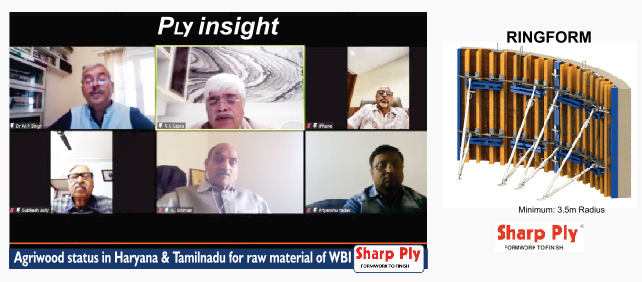
MP Singh:
- There should be an Agroforestry Board in Haryana. Because implementation is more important than policy. There should be a Wood Council for policy making.
RK Sapra:
- We are going to propose the Agroforestry Board to the government. In this, the Agriculture Department will be given the work of R&D and Extension; the Forest Department will provide the saplings.
R C Dhiman:
- Every plant (tree) in Punjab is going to be digitalized. This data shows how many plants of which species are planted in which field. Digitalization of plants is also going on in UP. This system will be extended in the country in future.
- The obstacle is that this data is not linked when the wood is harvested and transported. If this is linked a big hurdle will be solved.
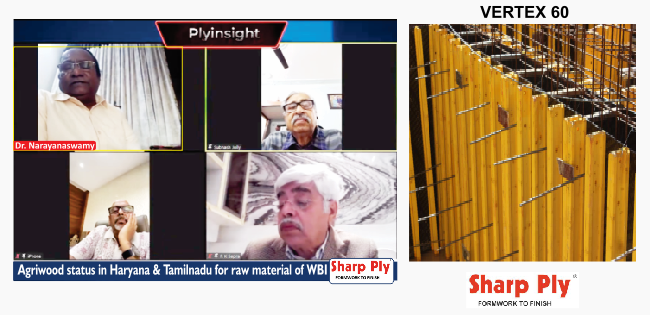
Naval Kedia:
- Problems may arise even if the FSC certificate is not verified.
- I have been using FSC for six years, but FSC can be misused. Because when you export wood product, which have FSC certificate, but if you cannot provide the source of your wood, the containers are sent back.
- There is no need to get too excited about the FSC certificate; one has to be very careful with this certificate.
MP Singh:
- Because FSC this certificate is not valid if the rules of that country are not followed. The government should have a role in the certificate. Because if any such problem arises then the government can negotiate at its own level.
R C Dhiman:
- Why is FSC certificate required? How many units are there who export? There will be one or two industries which are capable of exporting, they should take this certificate. Therefore, there is a need to think about FSC at the grassroots level.
Dr K T Parthiban:
- Fortunately, in TN we have done a total survey of industries. We have updated wood demand status up to 2023. There are 7 industrial sectors in this regard – Timber, Ply & Panel, Pulp Wood, Match wood, Packing case, Furniture & other construction industry, Energy industry.
- Thanks to the consortiums and industries, we have got a clear ground picture of wood requirements here. They have shared all the information. It is not based on assumptions.
- The requirement for solid wood alone goes anywhere between 60 to 70 lakh tons per annum. Energy sector: Thermal plant –100% biomass, Cogeneration plant – biomass as major energy, third one is co-firing plant. For all these we need between 90 to 100 lakh tons.
- So in the State of TN, to meet the demand of around 180 lakh tons of wood, we have estimated that around 4.4 lakh hectares have to be developed, in the form of farm forestry or agroforestry. TN is housed with 26 lakh hectares under fallows out of 130 lakh hectares. These areas are amenable.
- Industries have also expressed their interests to develop AF model. Technology is available. Only thing is we have to choose a model. Currently at Forest College & Research Institute, we are talking to every industry and designing an out grower scheme. An out grower system (contract farming) links network of unorganized small holder farmers with buyers.
- As on 2022 the annual requirement is 10 lakh tons per annum for the existing ply and panel industry industries alone. New industries are coming like Greenlam. Their annual requirement is around 3 to 5 lakh tons I believe. And Century is putting up a particle board industry. Their annual requirement is around 3 lakh tons additionally by June 2024. Another plant is coming in Tuticorin where the annual requirement is expected to be 5 lakh tons. So in the coming 2 years, wood demand in TN is going to be 20 lakh tons for ply and panel industries alone. Earlier it was only eucalyptus. Then eucalyptus and melia. Now some of the industries have also started using casuarina, which is a good sign.
- So overall, land is available, industries are coming up, and technology is available. What is missing is the pricing pattern. Lot of price fluctuations in the last 6 months. The consortium is trying to achieve consistency. All the industries have to promote organized AF system. I am not talking about agricultural land. I am talking about current fallows. Means where it was used for agriculture, with irrigation facilities. Only thing is, we need a mission mode approach.
- Fortunately all our suggestions have been taken up in the Green Tamil Nadu Mission.
- We have prioritized multiple species for each industries. For example 5 to 7 species in ply and panel industry. We have developed genetic resources. Clone banks are available. That is getting amplified through the consortium nurseries. We are talking to the industry to implement huge projects. Some are already implementing. Some are awaiting implementation. Demand pattern is assessed. Tree species are identified.
- We have designed a model of out grower scheme and there is a possibility of participation from all sectors. Once the industry decides to serious undertake technology leveraged AF projects, if not today, by another 3 to 5 years, I think we can reap our benefits.
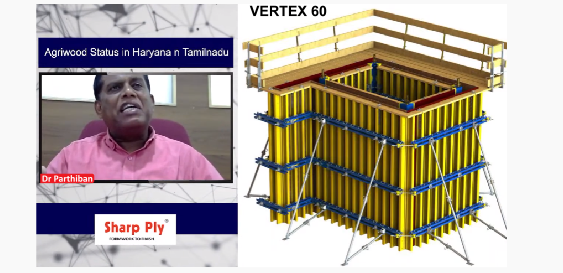
Dr. Narayanaswamy:
- I am telling from the perspective of farmers because we farmers need lot of support from industry and govt.
- First of all we are proposing to TOFI and Govt of TN for decentralization of nurseries supplying Quality Planting Material (QPM) so that farmers get QPM from nearest source.
- QPM is a major issue we have taken up because after growing 3-4 years if the specific yield is not there, that’s a big concern for the farmers to obtain optimum yield, especially for Melia Dubia which is popular in TN. Eucalyptus is not popular in TN because it is not encouraged from the Govt side.
- At the moment the price for farmer is about 9,500 per ton. Farmer spends 3 to 4 thousand for the harvesting, loading and transporting to factory. If farmer gets around 40 tons only he will earn some income. Otherwise it will just be a farming activity with no income.
- So we are working with TNAU and other manufacturers to have a cost structure to realise 12,000 per ton. Supplying to pulp industries is not viable for the farmers. We are banking on the plywood industries because of better price. We are focusing on better weight at shorter durations.
- As such there is no AF policy in TN. It is a grey area.
- Another aspect is GST. It is 18% and farmer has to bear the cost.
- At the national level we want the government to constitute a single window Board just like the Tea Board etc. Many missions like National Horticulture Mission are there. So it is our request to constitute a single window Tree Board or AF Board, under Commerce ministry. Not under Forest Dept.
- We have also requested the TN govt to provide 6 hubs for marketing timber. Not only Melia Dubia, but also other plantation timber. A special economic zone kind of wood market should be available for the farmers to market it.
- Regarding Eucalyptus plantations, there is no problem of planting in private land and transportation. But neighbouring farmers complain to officials about it because of the mindset that eucalyptus sucks more of groundwater.
Dr Parthiban:
- Regarding interstate ban of eucalyptus, it was done to ensure raw material availability for TNPL which is a govt company. It was for one year duration only. The period is actually over but there may be another GO needed to nullify the previous GO for which we are waiting. There have been lot of requests from industries also.
- Regarding Melia Dubia, farmers are getting up to 10,500. Around 1,200 per ton is the felling cost now. Transportation depends on the industry location. Industry is paying varying prices, which is the problem.
- The industries should facilitate felling and transportation.

